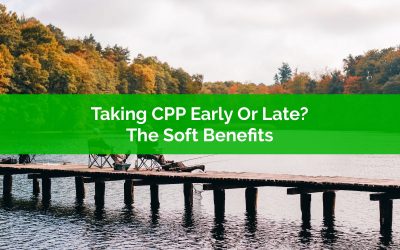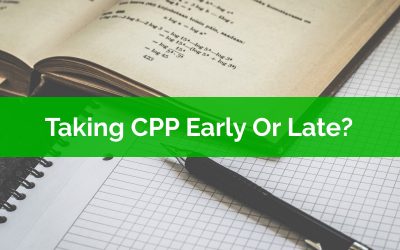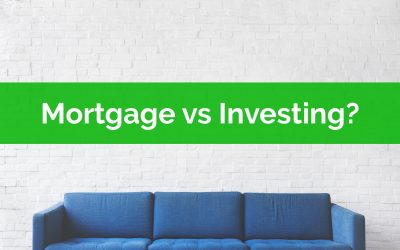Congratulations! You’re on the waitlist!
We will e-mail you before the bootcamp launches for an exclusive preview.
Check out our latest blog posts…
Taking CPP Early Or Late? The Soft Benefits
In the last blog post we looked at the financial considerations when deciding to take CPP early or late. But personal finance is never just about the money. Half of personal finance is personal. The “best” path varies from person to person even when the numbers are exactly the same. When it comes to taking CPP early or late these personal considerations can make a big difference.
There are many “soft benefits” to taking CPP early or late. These benefits can make taking CPP early look more favorable… or it can make taking CPP later look more favorable… it just depends on how much YOU value each benefit.
Before deciding to take CPP early or late it’s important to understand what your goals are for retirement. Not just financial goals but personal goals. What do you want to do in retirement? What does your retirement look like? This may inform some of your decisions around these “soft benefits”
It can also help to have a financial plan and see how taking CPP early or late helps you achieve your financial goals. Everyone is different, and the decision to take CPP wont be the same for everyone.
Taking CPP Early Or Late? How Long Until Breakeven?
Should you take CPP early or late? Are you considering taking CPP early? Are you wondering if you should delay? Should you take it early at age 60? Should you wait until regular retirement age at 65? Should you delay until age 70, the last date possible?
When to start taking CPP is just one of the many difficult decisions soon-to-be retirees face as they approach their retirement date.
It’s a big decision, and like many financial decisions there are many aspects to consider when deciding when to take CPP.
When a soon-to-be retiree is deciding to take CPP early or late there are both financial considerations as well as non-financial considerations to weigh.
Taking CPP late can provide a financial benefit if you plan to live past a certain age. This is a number and it’s easier to evaluate but it’s based on longevity, which is a big unknown.
Taking CPP late also has non-financial considerations. There are “soft benefits” to delaying CPP. Depending on how much you value these soft benefits they can be worth quite a bit as well.
Even when two people have the exact same financial situation, they may choose different times to start CPP simply due to these longevity questions and soft benefits.
When deciding to take CPP or delay its first important to get basic understanding of how CPP works and how CPP payments change each year as you delay.
Should You Consider Paying Off The Mortgage Early or Investing Instead?
Paying off the mortgage early can be a fantastic financial goal. In the last post, we looked at the different ways to pay off a mortgage early, how to make a mortgage payoff plan, and talked a little bit about the benefit of paying off the mortgage early.
In this post, we’re going to look at some considerations when deciding to pay off the mortgage early vs investing. This is a common dilemma for many people in Canada. Where should they put extra cash? Against the mortgage? Or in non-registered investments?
Generally, it’s better to invest inside an TFSA or RRSP before choosing to pay off the mortgage early. There is no annual tax impact when investing inside either of these two accounts. Investments can grow tax free. This can make it more attractive to invest inside an tax advantaged account before paying off the mortgage early. But not always…
RRSPs can be counterproductive at certain income levels and in certain situations. Investing inside an RRSP for someone expecting a very low income in retirement might not be the best use of those extra funds. They may experience large GIS claw backs on RRSP withdrawals in retirement. In those cases, it may make sense to pay off the mortgage early before maximizing RRSP contribution room.
As always, when making a financial decision, like paying off the mortgage early vs investing, it’s important to look at the whole financial picture and not just one aspect. If you’re struggling with this decision then it might be helpful to get a custom financial plan from an advice-only planner.
Deciding to pay off the mortgage or invest isn’t just about taxes and investment returns… there are also a bunch of soft benefits to consider. These aren’t pure financial benefits but they can still be “worth” a lot depending on how much you value them. Make sure you consider the financial benefit of paying off the mortgage early but also the soft benefits as well.
To decide between paying off the mortgage or investing we absolutely need to look at the after-tax rates of return. We’re going to assume that we’ve maximized our RRSP and TFSA contribution room already and are deciding between paying off the mortgage or investing in a non-registered investment account.



